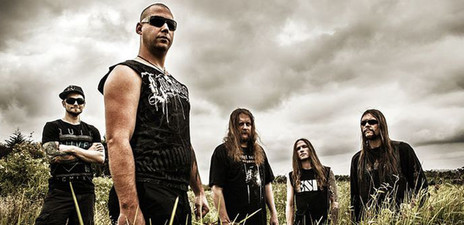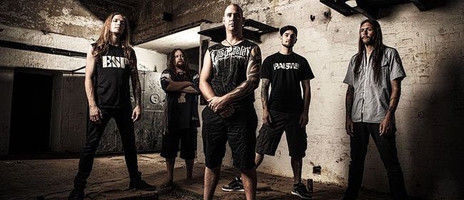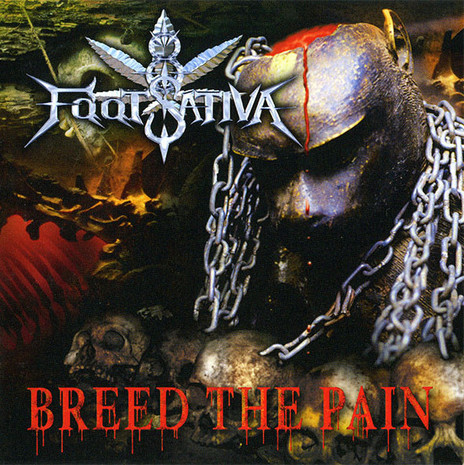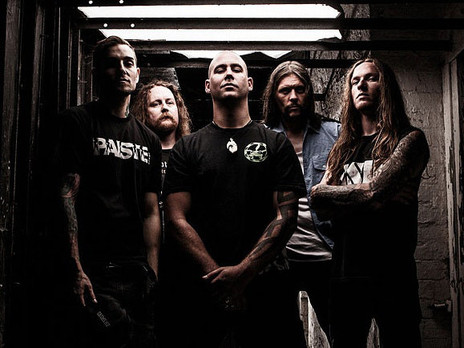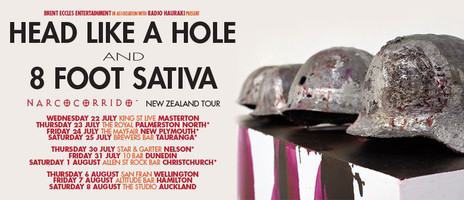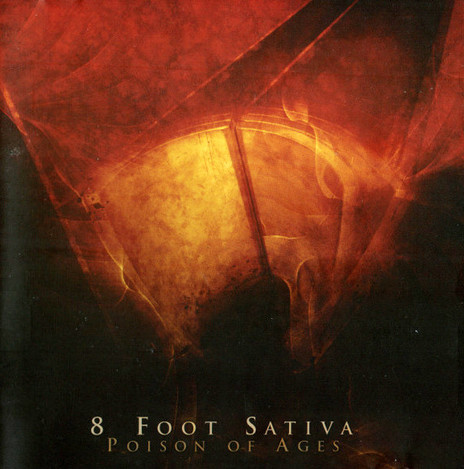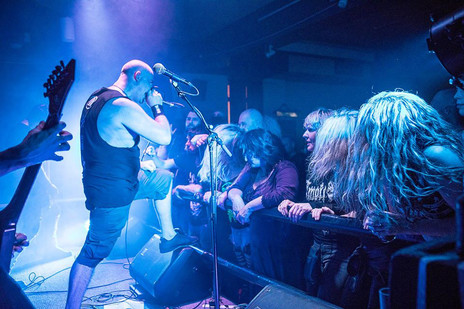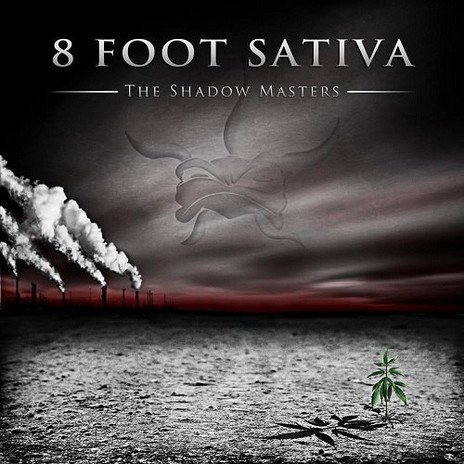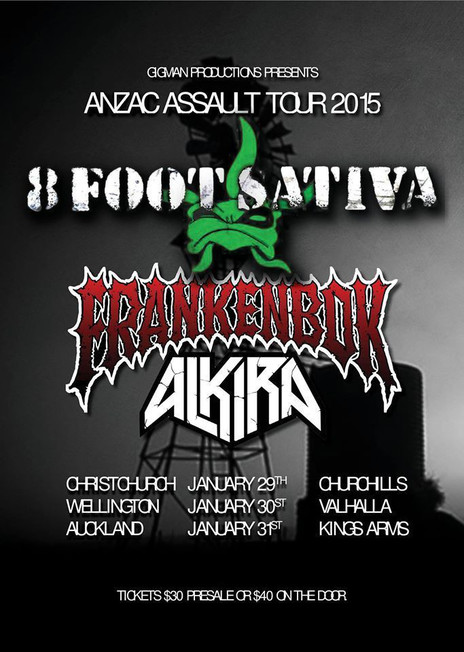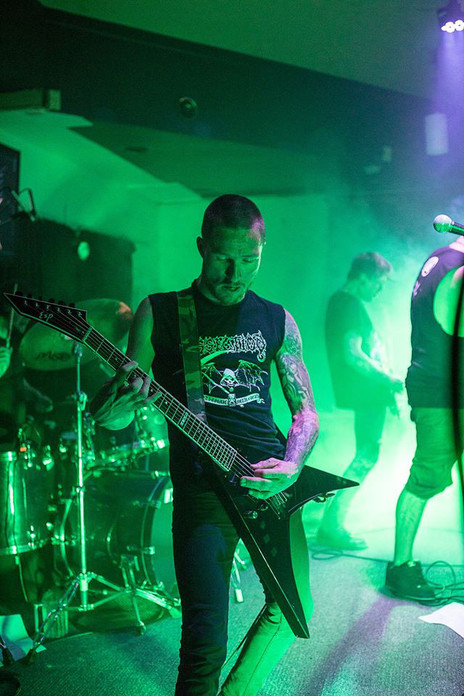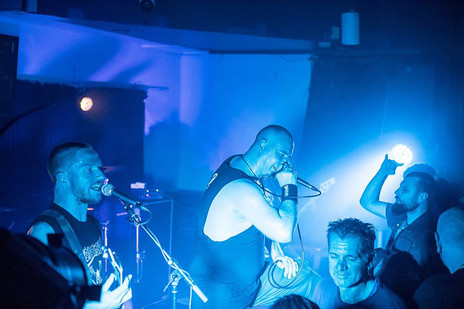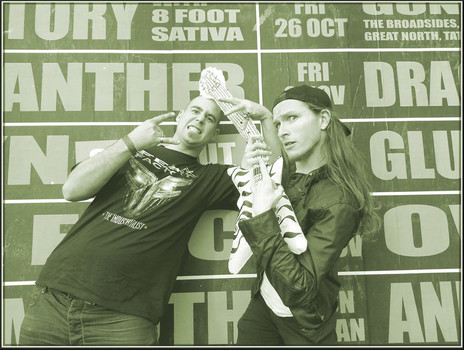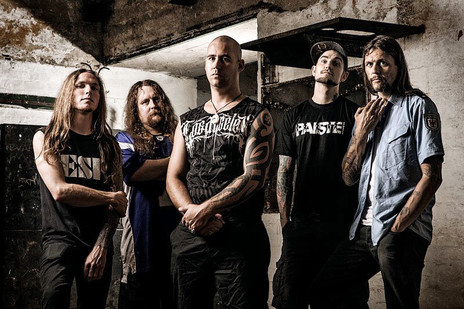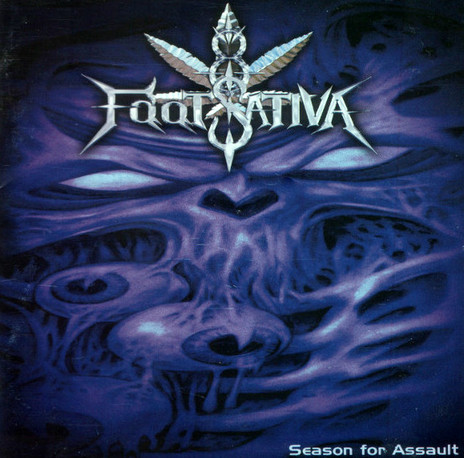Metal fans Brent Fox and Gary Smith met at Massey High School in West Auckland. They soon started playing together, working hard to up their technical skills. Smith had spent two years at the Guitar Institute in North London, and Fox was studying for a degree in music at the University of Auckland but dropped it for metal. With drummer Pete Young, vocalist Ari (who wrote the lyrics to three songs on the band’s first album) and bassist Fat Dave, they formed a covers band that played Pantera, Iron Maiden, Sepultura, Metallica, Judas Priest and, of course, Slayer.
Natural Entrepreneurs, the band negotiated a sponsorship deal with a supplier of hydroponic systems
The entrepreneurial band negotiated a sponsorship deal with Switched On Gardener, an Auckland supplier of hydroponic systems. Pete Young (also known as “Speed”) left almost as soon as the record was done, and with replacement Sam Sheppard on drums they quickly became a hugely popular live act, with the band’s eponymous anthem becoming widely known and the album eventually achieving gold status in New Zealand. Ari disappeared from the scene, so vocalist Justin Niessen joined the band, Brent replaced Fat Dave on bass, and they released their first album, Hate Made Me, in 2002 on Intergalactic Records in New Zealand. The album was released internationally in 2004 by the Swedish-based Black Mark Productions.
8 Foot Sativa brought a competitive, professional attitude to the metal scene, and an intense focus to their career and stage presence. Justin “Jackhammer” Neissen would pour every last ounce of energy into his vocal delivery, to the point of occasionally blacking out on stage.
Always enterprising and determined to push the envelope and expectations for metal in New Zealand, they scored Trade New Zealand support and joined a notable bevy of artists (including The D4, Goodshirt and Betchadupa) heading to South By Southwest in Austin, Texas in 2003. They followed it up with a visit to the Canadian Music Week in Toronto where they played an unscheduled 3am set at an after-party in the penthouse suite of the Westin Harbour Castle Hotel.
A great “band diary” write up of this trip from New Zealand Musician magazine (April-May 2003) outlines the whirlwind tour from LA to Toronto, New York to Austin, London to Melbourne (where they secured their deal with Australia’s Roadrunner Records), making connections and lining up new shows (as well as cancelling existing ones due to Justin Nielssen coming down with a bout of tonsillitis). The whole piece is peppered through with classic seat-of-your pants rock ’n’ roll tour ups and downs.
Some dates in Hong Kong were cancelled when the chance to play with Soulfly (the American band started by ex-Sepultura legend Max Cavalera) came up while they were in London.
The trip was an auspicious start to 8 Foot’s overseas career, but it must be noted that Andrew Featherstone of Intergalactic Records was an important player in supporting their journey from local rockers to metal artists with an international profile. His Featherstone Studios/Area 51 base in New Lynn provided a place for the band to hone their skills and start recording, and in-house engineer Mike Pavlevitch was key to their debut album sounding as good as it did.
Their second album, Season For Assault, followed in 2003. Recorded at Auckland’s York Street Recording Studios and engineered by Clint Murphy (Blindspott), it accrued production costs of $40,000, possibly a first for a local metal act. The album reached No.6 on the New Zealand album charts (three of their six albums have made it into the top 40 album charts locally). The track ‘Believer’ is featured on the soundtrack of The Locals, a film by Greg Page, who had also directed the band’s first music video.
8 Foot Sativa toured in support of the album through Canada, US, UK and Australia. Locally, the band were determined to break metal out of its box both in relation to other types of music, as well as among its fiercely contested sub-genres.
The band travelled to Sweden to record their third album, Breed The Pain (2005).
Fox: “We’ll play with anyone, we’re into it together, helping each other out. We work together because we want to create the [metal] scene and it’s only by working together that you’re gonna do it. As soon as you get arrogant competition, that’s when you suck.”
Sheppard: “When we play with (Tadpole and Goodshirt) we’re the hard-out band, but when we play with Dawn Of Azazel we’re the softies. But we’re just us, and everyone else can do what they like.” – Scott Kara, Rip It Up, Feb/Mar 2003.
The band travelled to Sweden to record their third album, Breed The Pain (2005), at Studio Underground in Vasteras. Vocalist Niessen resigned from the band a week out from the trip, and was replaced by Matt Sheppard, drummer Sam’s brother (both had played together in the band Sinate). Recording the album in Sweden, including flights, cost three-quarters of the previous album’s total budget and put them in the same recording space as some of their favourite metal acts, alongside metal-scene legend Pelle Saether. This trip also secured the band distribution worldwide through Black Mark Productions.
At that time the band members were all vegan and chose to put their beliefs up front in the music video for their self-released 2009 single, ‘Sleepwalkers’. Thematically close to the clip by director/musician Stuart Page for The Skeptics 1992 song ‘AFFCO’, 8 Foot’s video by director Duncan Eastwood follows a steer from the farm, through its death and processing at the freezing works, and finally a part of it is shown as a shrink-wrapped package being purchased by a happy mum at the supermarket.
Poison Of Ages, 8 Foot’s fourth studio album, followed in 2007; it was again recorded at Studio Underground in Sweden with Pelle Saether. Drums were played on the sessions by Stefan Westerberg from Sweden’s Carnal Forge, and vocals were handled by Ben Read (Ulcerate), the band’s third singer. A business deal went bad while the band were recording, leaving them part-way through the production process with no money to finish. Saether was understanding and came to an arrangement with them to complete the record and sort him out later, but the pressures were mounting.
Line-up changes continued to be a part of the 8 Foot Sativa story. Corey Friedlander was a 17-year-old at Avondale college. He left school in 2005 to commit to 8 Foot full-time, but it wasn’t long before the highly skilled Jamie St. Merat (Ulcerate) stepped in to take his place. Gary Smith was having difficulty with severe RSI in his wrist, so William Cleverdon (Ulcerate) was handling some guitar duties. On top of this, founding member Brent Fox had finally had enough of handling the business side of things and split shortly after the Poison Of Ages album was done.
The band toughed it out and changed the way they had been doing things by stepping away from Intergalactic Records and forming their own company, 8FS. Recruiting Rom Lee and Christian Humphreys from NewWayHome to round out the line-up, 8 Foot were up and ready to tour and promote the self-released Poison Of Ages when it had looked for a time as if the band was a spent force.
A hiatus followed, with some members forming another band in the interim, called A Mark of Man. A best-of album, Ten Years of Sativa followed in 2009, and by 2011 the line-up had returned to something close to its original form, with Justin Niessen returning on vocals and bassist Brent Fox back in the fold. Gary Smith had recovered from his RSI, and along with Corey Friedlander on drums and Nik Davies (Perditionist) on guitar they were soon ready to record album number five.
For 2013’s Shadow Masters the band stayed in New Zealand to record at Quicksand Studio in Christchurch, bringing expat New Zealand producer Clint Murphy back from Modern World Studio in the UK to produce. A polished production style highlighted the band’s melodic aspects, and shorter, punchy songs gave the album more of a thrash feel than the death metal territory the band had explored previously, with some seriously funky grooves emerging in the breakdowns.
The band toured the album in New Zealand and Australia. The stage has always been where 8 Foot Sativa are happiest, and they particularly rate South Island crowds as New Zealand’s most passionate.
The band has stated in interviews over the years that they started out with an intention to try to bring metal music into mainstream acceptance in New Zealand. Alongside their more commercial contemporaries Blindspott [and latterly, Beastwars and Alien Weaponry], they have done just that, gaining commercial radio play and significant music TV and press coverage to match their impressive sales figures.
